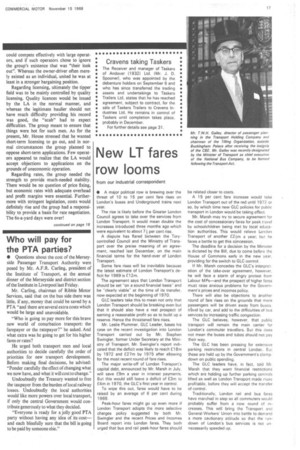New LT fares row looms
Page 19

If you've noticed an error in this article please click here to report it so we can fix it.
from our industrial correspondent
• A major political row is brewing over the threat of 10 to 15 per cent fare rises on London's buses and Underground trains next year.
The rise is likely before the Greater London Council agrees to take over the services from London Transport. It would mean double the increases intioduced three months ago which were equivalent to about per cent rise.
A dispute has flared between the Torycontrolled Council and the Ministry of Transport over the preise meaning of an agreement, reached last December, on the main financial terms for the hand-over of London Transport.
Some fare rises will be nievitable because the latest estimate of London Transport's deficit for 1969 is £12m.
The agreement says that London Transport should be set "on a sound financial basis" and be "clearly viable" at the time of its transfer, now expected at the beginning of 1970.
GLC leaders take this to mean not only that London Transport should be breaking even but that it should also have a real prospect of earning a reasonable profit so as to build up a reserve. Hence the threatened fare rises.
Mr. Leslie Plummer, GLC Leader, bases his case on the recent investigation into London Transport carried out by Mr. Stephen Svvingler, former Under Secretary at the Ministry of Transport. Mr. Swingler's report indicated that the deficit was likely to reach £1 8m by 1972 and £27m by 1975 after allowing for the most recent round of fare rises.
The major write-off of London Transport's capital debt, announced by Mr. Marsh in July, will save £9m a year in interest payments. But this would still leave a deficit of E3m to E4m in 1970, the GLC's first year in control.
To wipe this out, fares would have to be raised by an average of 6 per cent during 1969.
Peak-hour fares might go up even more if London Transport adopts the more selective charges policy suggested by both Mr. Swingler and the recent Prices and Incomes Board report into London fares. They both urged that bus and rail peak-hour fares should be related closer to costs.
A 15 per cent fare increase would take London Transport out of the red until 1972 or so, by which time nevi GLC policies for public transport in London would be taking effect.
Mr. Marsh may try to secure agreement for the cost of concessionary fares for peak travel
by schoolchildren being met by local education authorities. This would relieve Landon Transport of another E2-1m a year; but he faces a battle to get this concession.
The deadline for a decision by the Minister is dictated by the Bill, due to come before the House of Commons early in the new year, providing for the switch to GLC control.
If Mr. Marsh concedes the GLC's interpretation of the take-over agreement, however,
he will face a storm of angry protest from Labour M Ps—and the prospect of higher fares must raise anxious problems for the Government's prices and incomes policy.
There will also be objections to another round of fare rises on the grounds that more passengers will be driven away from buses. tr'avel by car, and add to the difficulties of bus services by increasing traffic congestion.
The GLC believes, however, that public transport will remain the main carrier for London's commuter travellers. But this does not mean the buses and tubes should not pay their way.
The GLC has been pressing for extensive parking restrictions in central London. But these are held up by the Government's clampdown on public spending.
The GLC leaders have, in fact, told Mr Marsh that they want financial restrictions which are holding up further parking controls lifted as well as London Transport made more profitable, before they will accept the transfer of control.
Traditionally, London rail and bus fares have marched in step so all commuters would probably suffer from a new round of increases. This will bring the Transport and General Workers' Union into battle to demand a more cautionary attitude so that the rundown of London's bus services is not on necessarily speeded up.




















































































































